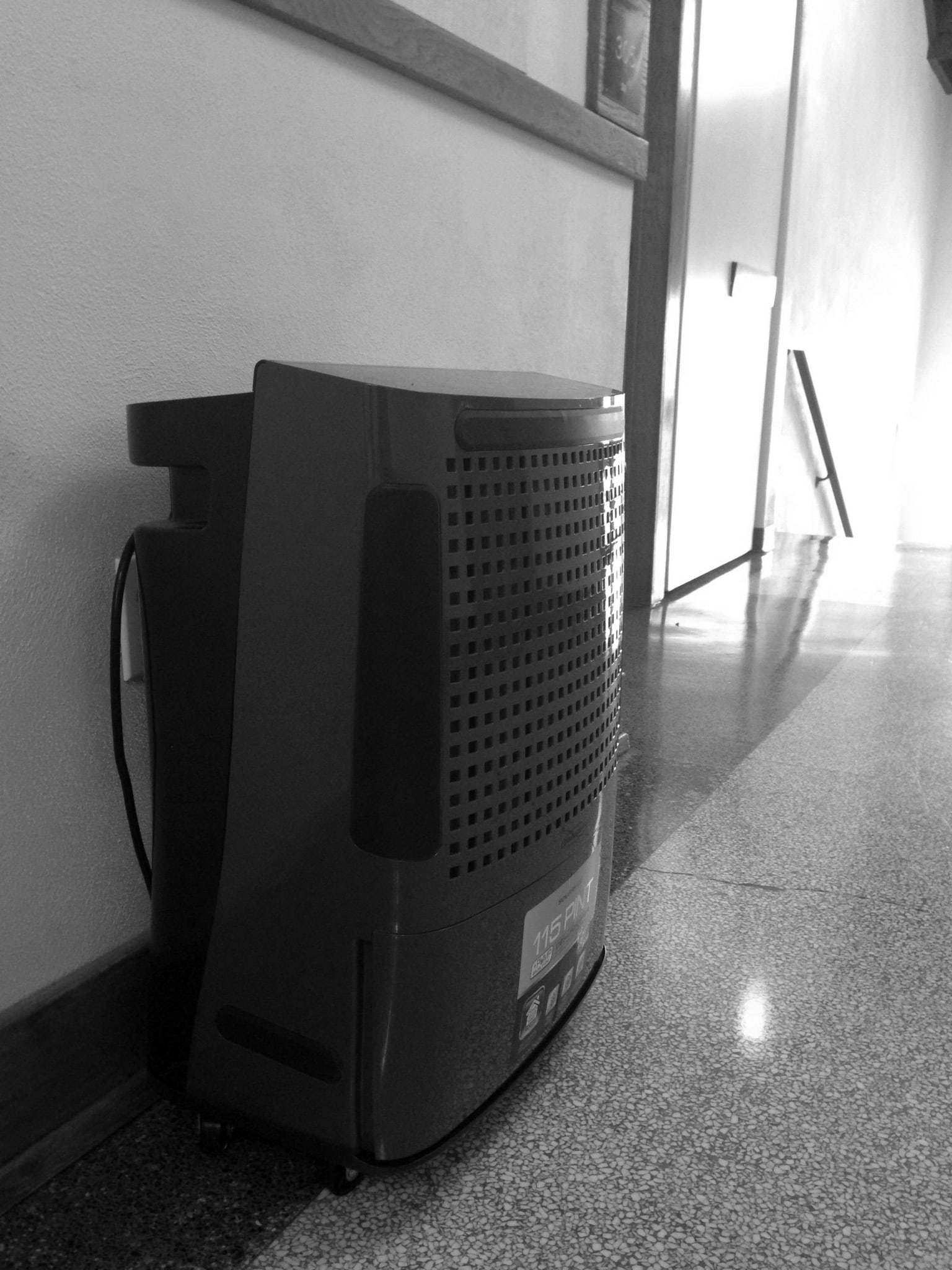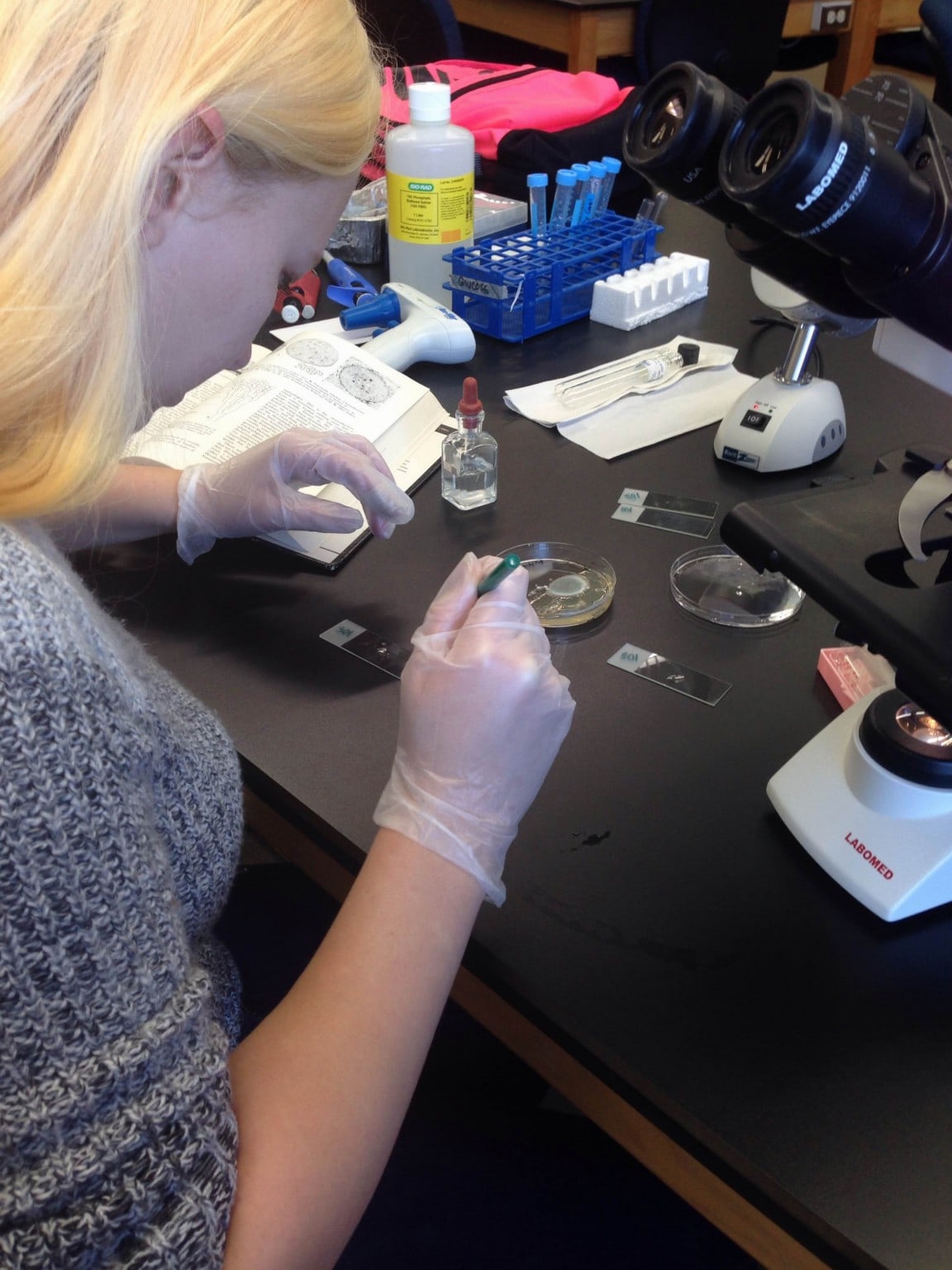Much of the Blackburn community is aware of mold issues in Jewell Hall, the freshman living learning community dorm on campus. However, what many students, faculty and staff might not know is that there currently is fungal growth in Hudson, the academic building on campus that houses various faculty offices and classrooms.
According to professor of English Dr. Ren Draya, whose office is in the English and communications suite on the third floor of Hudson, mold growth in the building is not a new issue. Draya referenced emails dating back to 2008 in which she had reached out to the administration and requested a solution to the long-term issue. “This is an old brick building,” said Draya. “It is in many ways a wonderful place. However, there are many serious problems because of its age and because of the fact that renovations and changes have been made. We’ve been complaining for a long time.”

A dehumidifier placed on the third floor of Hudson
Some faculty members have experienced symptoms consistent with an allergic reaction, including intense headaches. According to Draya, one professor often has to work in the library as opposed to her office. “Students are affected, anyone who has a class in Hudson which is probably everybody on campus, and certainly professors who spend often hours in our offices.We’re all concerned,” said Draya.
Draya requested that physical plant open the transom in her office in hopes of improving air circulation. However, Draya believes that the problems might be more severe than what a few simple fixes can cover. “These are tiny bandages when what is needed is a major repair,” she said. “My gripe is not with physical plant or the student workers. It is simply the reality of a very old building that has served us wonderfully – but what’s up there?”
According to Campus Services Supervisor Torry Grady, there have been ongoing repairs to the windows and the HVAC system in Hudson. Earlier this semester, dehumidifiers were placed on the third floor. Grady blames much of the issue on this year’s particularly high moisture, precipitation and barometric pressure.
Regarding Jewell, Grady said that physical plant has been in contact with air quality specialists who have done air tests. “I haven’t seen any mold. Mildew is the biggest thing,” stated Grady, regarding Hudson. “Mold would be, of course, a problem. Mildew is still a problem, but mildew is not anything that’s going to be harmful to anybody which is why every so often we have these air quality tests and they’re scheduled whenever we recognize that there’s a problem in the building.” He added, “These buildings do get checked periodically just as part of the protocol, preventative maintenance type deal.”
We took cultures of spore growth noticed in various locations on the third floor of Hudson. One sample was collected from the air vent in Director of Technology Services Jason Cloninger’s office, and we were able to grow and identify at least three types of mold: penicillin and two species of aspergillus (see Making the Mold, page 3). People who are allergic to penicillin may experience severe symptoms.
Grady did confirm mold growth in Cloninger’s office, which is also located on the third floor of Hudson. “I would be more prone to call that mold,” he said. Grady said that Cloninger’s office is the only area in Hudson that shows fungal growth, and links the issue to a hard rain that happened while repairs were being made to windows and lintels. “Basically what we can do right now is replace those ceiling tiles, clean the area, remove it all and hope and pray that it doesn’t get so humid outside that it creates that problem again.”
According to chair of biology Dr. James Bray, who also serves on the facilities and budget committees, “The aspergillus [is] probably not that big of a deal, but knowing that there’s penicillium [penicillin] there and that we have people that’s allergic, that something needs to happen, either dehumidifiers [or] something that would slow the growth or curve growth.”
Bray said, “Being in budget and on facilities I get to see this on both sides…and one of the biggest problems in Hudson was the company that came in and pulled all the window parts out when they were redoing the windows on the north side. This really started when they [the company that repaired the windows], for whatever reason, they tore all those windows out, and then it stormed. Well you get water in the walls when that happens…I don’t know that they did anything to remediate that before they fixed the windows, so now they fixed all the windows, well they basically just boarded it up in the building.”
“Anytime you have any kind of climate issues like that or, you know, inner building control issues, that needs to be addressed,” Bray added. “And the bad thing about a lot of this stuff is if it gets in the duct work, it’s a pain to get it cleaned out. Once you get it in the ventilation system, it’s tough to get it cleaned out. It can be done, but it’s tough to do.”
“We have everything that we can have to battle this; really we’re fighting time and the seasons, and 22 other buildings on campus that got to be taken care of in the meantime,” said Grady. “But it’s not something that’s been overlooked, [or] that hasn’t been addressed; we know all of these problems…we wait for breaks, we wait for weekends, we wait for summer breaks, things like that and in the meantime we fight it the best we can with the product that we have until it comes back and then we do it again.”
“If it’s not Thanksgiving break, it’ll be Christmas break. If it’s not Christmas break, it’ll be spring break, then summer break,” said Grady. “When can we address Hudson by itself, you know, and take care of that? I wish I knew the answer to that.”
Grady added, “And we’re definitely not avoiding it. And unfortunately perception is reality, so what other people perceive as ‘Boy, wow, I can’t believe they haven’t even done anything over here yet.’ It’s not necessarily that, it’s just that we do have things that prioritize over this.”
“Most of our problem over the summer was we had air units that were down so they weren’t circulating air the way that they needed to,” said Vice President of Administration and Finance Steve Morris. “We’ve resolved those issues since that time period. We still have some drywall repairs to do; some work to do in the stairwell, you can see that there’s still some patching and repairs to do like that. I think that’s planned for Christmas break.”
Steps are being taken to address the issue in Jewell as well. Morris explained that a certified industrial hygienist took samples in Jewell and reported that some spore counts were lower than outside, but others were higher in some areas. The hygienist also reported that the growth could potentially cause problems for people with allergies. Morris then explained that cleaning up Jewell was an expensive proposition that required a $100,000 deductible.
Morris, who is also the chair of the facilities committee, said he was unaware of the current fungal growth in Hudson as well as any health issues related to it. “I have to admit I wasn’t aware of us having that kind of activity there; I knew that we had mildew that popped up over the summertime based on the air conditioner being down but didn’t realize we still had it in the environment.”
He added, “My understanding was once the HVAC system was fixed that that cured a lot of the problems and once the water leaks from outside were fixed that cured a lot of the problems, but [what] we were focusing on fixing was drywall, and fixing the walls where the leak had come in inside.”
“Honestly I wasn’t aware of any healthy issues at all related to it. One of the first steps I would take would be to reach out to our consultant and ask her about this type of environment and what she recommends based on what we’re telling her. I think that’s a good place to start.” Morris said he would be talking to the HVAC supervisor Kevin Wise, as well as the air quality specialist and potentially a worker’s compensation insurer.
“I would say that anything [that] folks think is generating sickness needs to be a priority. Work environment’s going to be important, just like the environment for students that are in a living environment. Both of those are important.”


1 comment
This is very interesting about each building currently under watch. My issue is why there is still not more information on Jewell and it’s mold problem considering this has been an issue, a major one at that, for a few years. As the RA for 2015-2016 in Jewell, I was hired to stay over the Christmas Break. One of my expectations was to clean every room that had a black and sometimes red mold like substance growing around the windowsill. The problem was that every room had this issue. After cleaning over half the rooms, I woke up the next morning extremely Ill and had some respiratory issues. My question is, with Student life and Physical Plant knowing about this problem for at least 2 years, why has more not been done to solve this issue already, especially since this is the dorm to leave an impression on the Freshman for Blackburn?!